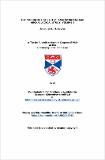The 'Chronicle of Perth': an historical and archaeological study
Abstract
This thesis features a full transcript of NLS Advocates MS. 35.4.4, The "Chronicle of Perth". The
manuscript volume was edited and published by James Maidment in 1831 for the Maitland Club of
Glasgow; however, Maidment's edition represents only a partial transcription of the original volume,
and the editor provided few textual notes. I have written a substantial commentary to accompany
the text; my work on the "Chronicle" is intended to improve upon and replace Maidment's edition.
The manuscript volume was probably compiled between c. 1590 and c. 1668, and incorporates a
variety of subject matter: copies of official correspondence, a register of deaths and, chiefly, a
register of historical events of local and national significance in the 16th and 17th centuries.
Editorial work in this thesis includes detailed analysis of the structure and provenance of the
manuscript, a study of the veracity of the historical notices, and an assessment of its place in the
local literary context. The "Chronicle" is an anonymous work; but suggestions concerning the
identity of its authors have been made following handwriting analysis and a comparative study of
the manuscript with other documents in the Perth Burgh Records. The "Chronicle" can be dated
through internal evidence, and also by study of the manuscript paper.
Numerous archaeological excavations have been carried out in Perth during recent years. The
results of this work have substantially augmented the historical record of life in the medieval and
early modern burgh, and archaeological evidence is certainly of considerable importance to
historians of Perth. This thesis seeks to assess the value of historical records for archaeologists
working in the burgh. This is essentially a theoretical exercise, but it should also have practical
consequences for archaeological research in Perth. It is the contention of my approach that
historical sources can be used in advance of archaeological investigation to pose archaeological
questions, to provide guidelines for research, and indeed to provide archaeological information.
In this thesis I have sought to demonstrate that the "Chronicle of Perth" contains useful
archaeological material in its own right, and that the manuscript indicates areas in which
archaeological study may develop our understanding of the 17th century environment, in both
town and country. The archaeological themes which emerge from the text of the "Chronicle" are
developed by reference to manuscripts in the Perth Burgh Records and existing archaeological
information. This thesis examines the climatic history of the Perth region in the early modem period
- with particular reference to damage caused by floods, harvest failures, and the spread of
infectious diseases - and the built environment of the burgh. Attention is paid to major public
buildings of the town, such as the tolbooth and St. John's Kirk, and to significant structures
beyond the town walls such as Lowswork and the Brig of Earn. A pervasive theme of this research
is an assessment of the burgh's complicated relationship with its rural hinterland. Features of this
study include the structure of the market economy in 17th century Perthshire, and the influence of
large estates within the landscape. The economy of the burgh of Perth was relatively weak in the
17th century, and the "Chronicle" directs particular attention to the disruption which was caused by
the Covenanting crisis of the 1640s and Cromwellian occupation of the 1650s; this thesis
considers the effects of those years upon Perth's economy.
The thesis is intended to form a substantial reference source for historians and archaeologists
working in Perth. At both theoretical and practical levels, this study considers the value of
documentary sources for archaeological research. The "Chronicle of Perth" can be used as an
introduction to the quality of life which was experienced within and without Perth in the early
modern period; archaeological themes which can be extracted from the text of the "Chronicle" can
be developed using the Perth Burgh Records to build up a portrait of the state of the built
environment in town and country. An important consequence of this research has been to
demonstrate the close association which exists between historical and archaeological information.
Type
Thesis, PhD Doctor of Philosophy
Collections
Items in the St Andrews Research Repository are protected by copyright, with all rights reserved, unless otherwise indicated.

